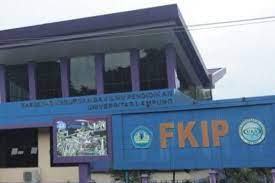Fakultas Keguruan dan Ilmu Pendidikan Universitas Lampung berawal dari Institut Keguruan dan Ilmu Pendidikan (IKIP) Negeri Jakarta cabang Tanjungkarang, kuliah pertama dimulai pada tahun ajaran 1966/1967. Berdasarkan Keputusan Presiden Nomor 7 Tahun 1968, IKIP Jakarta cabang Tanjungkarang diintegrasikan ke dalam Universitas Lampung menjadi 2(dua) fakultas, yaitu Fakultas Keguruan (FK) dan Fakultas Ilmu Pendidikan (FIP). Fakultas Keguruan terdiri dari jurusan Pendidikan Civic Hukum, Pendidikan Ekonomi Perusahaan, Pendidikan Sejarah, Pendidikan Bahasa Indonesia, Pendidikan Geografi dan Pendidikan Matematika. Sedangkan Fakultas Ilmu Pendidikan (FIP) hanya satu jurusan yaitu jurusan Pendidikan Umum. Berdasarkan Peraturan Pemerintah Nomor 5 Tahun 1980 dengan Keputusan Presiden Nomor 43/M/1982, Fakultas Keguruan (FK) dan Fakultas Ilmu Pendidikan (FIP) digabung menjadi satu fakultas, diberi nama Fakultas Keguruan dan Ilmu Pendidikan Universitas Lampung (FKIP Unila).
SEJARAH
LAB
acilities and infrastructure at Unila's Geography Education Study Program consist of lecturer rooms, offices, classrooms, laboratory rooms, seminar rooms, comprehensive exam rooms, reading/reference rooms, and other supporting infrastructure.
The lecturer room at Unila Geography Study Program consists of 9 rooms with a total area of 271.75 m 2 , with details of the division of space as follows:
|
Lecturer Workspace |
Number of Spaces |
Total Area (m 2 ) |
| One room for more than 4 lecturers |
There isn't any |
There isn't any |
| One room for 3-4 lecturers |
4 |
112 |
| One room for 2 lecturers |
2 |
84 |
| One room for 1 lecturer (not structural officer) |
3 |
77 |
| TOTAL |
273 |
|
In addition to having 9 lecturer rooms, the Geography Education Study Program has 1 office room, 6 classrooms/lectures, 3 laboratories, 1 seminar room, 1 comprehensive exam room, and 1 reading or reference room.
|
No. |
Type of Infrastructure |
Number of units |
Total Area (m 2 ) |
Ownership |
Condition |
Utilization (Hours/week) |
||
|
SD |
SW |
T |
ST |
|||||
|
1 |
Office | 1 | 993.6 | ️ | – | ️ | – | 39 |
|
2 |
Classroom | 6 | 918 | ️ | – | ️ | – | 48 |
|
3 |
Laboratory | 3 | 218.52 | ️ | – | ️ | – | 48 |
|
4 |
Seminar Room | 1 | 48 | ️ | – | ️ | – | 24 |
|
5 |
Comprehensive Exam Room | 1 | 28 | ️ | – | ️ | – | 16 |
|
5 |
Reference and Libraries | 2 | 5035 | ️ | – | ️ | – | 48 |
Information:
SD : alone, SW : rented, T : maintained, TT : not maintained
|
No. |
Types of Supporting Infrastructure |
Number of units |
Total Area (m 2 ) |
Ownership |
Condition |
Management Unit |
||
|
SD |
SW |
T |
ST |
|||||
| 1 | Imahagi |
1 |
12 |
️ |
️ |
FKIP | ||
| 2 | K . building hall |
1 |
225 |
️ |
️ |
FKIP | ||
| 3 | Swimming pool |
1 |
5000 |
️ |
️ |
UPT Fasora | ||
| 4 | Tennis court |
1 |
450 |
️ |
️ |
UPT Fasora | ||
| 5 | wipe. Badminton |
1 |
350 |
️ |
️ |
Private | ||
| 6 | Soccer field |
1 |
24700 |
️ |
️ |
UPT Fasora | ||
| 7 | Futsal field |
1 |
350 |
️ |
️ |
Private | ||
| 8 | GSG Unila |
1 |
16000 |
️ |
️ |
UPT Fasora | ||
| 9 | Polyclinic |
1 |
150 |
️ |
️ |
University | ||
PROGRAM STUDI
VISION
The vision of the Geography Education Study Program is by 2025 to become a superior and innovative study program in the field of geography and geography learning as well as adaptive to the development of science and technology.
MISSION
- Organizing innovative education and learning to produce professional graduates, with character, and having 21st century literacy and competence.
- Carry out research in order to develop science and technology to improve the quality of learning and produce geography-based scientific products.
- Carrying out community service in the field of geography and learning geography that is beneficial to the community.
- Forge sustainable partnerships with communities and institutions at local, national and international levels.
DESTINATION
- Produce educators and non-educators in the field of geography who are qualified, professional, highly competitive, mastering science and technology, and have character.
- Produce quality research outputs in the field of geography in the form of scientific publications, intellectual property rights, patents, and books.
- Improving community knowledge and skills in the field of geography through quality, innovative, and science-based service activities.
- Realizing sustainable cooperation with the central, provincial, district/city governments, the business world, and other stakeholders, both domestic and foreign.

 MASUK PTN
MASUK PTN